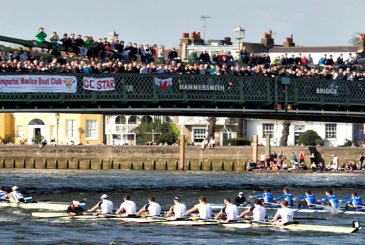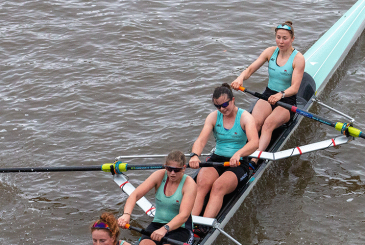The 2022 Gemini Boat Race shone a spotlight on the world of umpiring. The Secret Umpire reviews the Boat Race rules
Like many in the rowing world, I sit down in front of the television every year to watch The Boat Race. As a junior, I would watch with awe as the crews lined up under Putney Bridge, and would cheer and clap as they clashed and cut in front of one another, seemingly jostling for the fastest water despite the protestations of the umpire behind them.
Why are Oxford and Cambridge allowed to wash each other down and bring their blades together, when in any other race this behaviour would almost certainly lead to disqualification? The answer may be found in the fact that The Boat Race is a private match between two clubs with its own rules, and so is therefore not rowed under the British Rowing Rules of Racing.
The Boat Race rules do allow for a crew that is in clear water and ahead to move in front of its competitor, but it does this at its own peril. Should the crew behind gain ground and make contact, a serious issue could arise. However, much like the Rules of Racing, the Boat Race rules also contain a definition of a boat’s proper course, and that of a foul, thus (formally) clashing is forbidden.
The difference here must lie in the difficulties associated with determining a boat’s proper course on an unbuoyed stretch of tidal river. In a buoyed lake, it is straightforward to determine when a boat has left its proper course, as this is clearly defined by a line of coloured floats on either side. On the Thames, it is far less clear-cut.
Crews start taking corners at different points, and take and concede water – both deliberately, and through error. If you watch the helicopter footage of the races, it is noticeable how much the boats move across the river as they move along it. This makes the job of a Boat Race umpire very difficult, as often when the crews come together it is not clear which party, if any, is responsible for the foul.
As in any race, the Umpire has the best interests of the competitors at heart, and is loathe to exercise their right to disqualify unless the foul is obvious, and has seriously and unfairly impacted the ability of the fouled crew to win. This is the nuanced point and is the reason that the umpires spend so long training, practising, and watching races and matches.
The umpire has to make a decision as to whether an assignable foul has actually occurred, and, if so, whether it has realistically impacted either crew’s ability to win.
Decisions here will inevitably be controversial, as those involved naturally have a vested interest. Should the crews come together, regardless of who was at fault, the losing party will often claim that they were negatively impacted.
As with all rowing competitions, the umpire’s decision is final, and cannot be overturned. Acts of ’gamesmanship’ like clashing or moving to wash down a crew you are leading are strictly forbidden in the British Rowing Rules of Racing, and umpires will act very strictly should they occur, whether deliberately or by accident. It is never a good idea to try and gain an advantage by encroaching on your opposition’s water. Great efforts are made to ensure that each station or lane on a course is fair, and it is always to your advantage to remain in your own water.
The best of races should only see the white flag once, after all crews have crossed the finish line!










